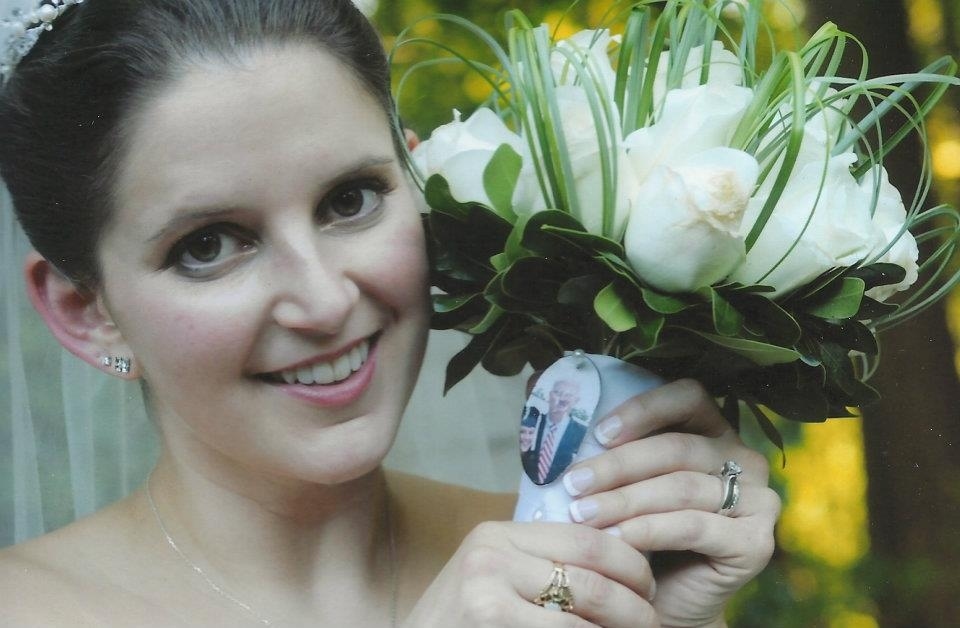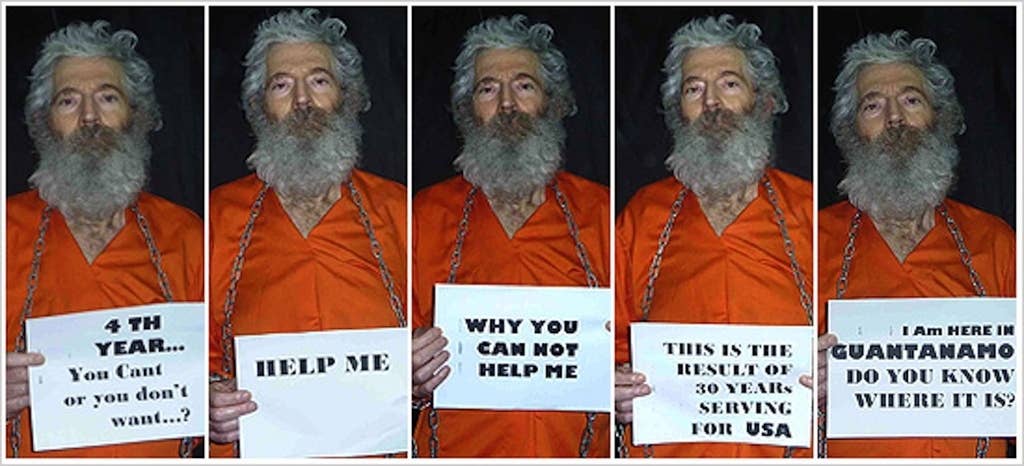
Ryan Moriarty wanted to propose to his girlfriend Sarah for two years but couldn't. This hesitation wasn't caused by nerves or fear of commitment; he just wanted to get her father's approval before he formally bent down on one knee. But this was more complicated than merely mustering up the courage. No one knew where he was.
Sarah's father is Robert Levinson, the retired FBI agent who was kidnapped off the coast of Iran in 2007 and whose whereabouts remain unknown to this day. After years of frustrating delay, Ryan asked permission from Sarah's mother and brother. Without hesitation they said yes — as did Sarah. But Levinson remains missing, and the six years since have delivered little in the way of comfort or closure for his family.
Information on Levinson's disappearance is scarce — barely more than a timeline of events leading up to his capture. He went missing in March 2007; his last known whereabouts were at a resort on Iranian-controlled Kish Island in the Persian Gulf. During a visit to Kish Island a few months after he was kidnapped, Levinson's wife Christine verified his signature (he has a very distinct signature, according to Sarah) both checking in and checking out of the hotel. He was in Iran as a private investigator, there to look into cigarette smuggling for a client, whom he was presumably meeting at the resort.
Christine has lead the charge in the hunt for Levinson since day one, still based out of her home in Coral Springs, Fla., where she raised her family. Aside from visiting Iran to try to find her husband for herself, she's gone on television numerous times to plead for help. She grants interviews to almost anyone who will tell her side of the story, from Fox News to Iranian-American websites like Payvand.com, and helps maintain the website and Facebook page dedicated to her husband.
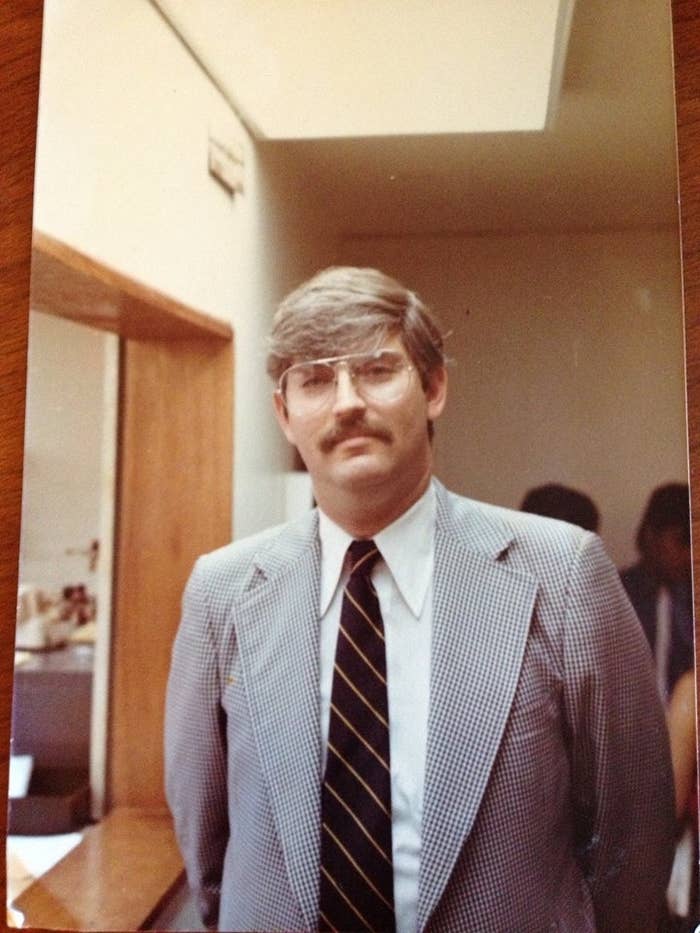
In his three decades working for the U.S. government, including with the FBI, he became an expert on the Russian mob, both in New York and later Miami. His work never apparently tied him to the Middle East or Iran, though a Freedom of Information Act request filed by BuzzFeed for more details into his FBI career was denied because his file is part of the ongoing investigation. It is believed that if still alive — and his family as well as the FBI say they have no reason to believe he is not — he's likely being held somewhere in Southwest Asia. Everything else is, for the most part, speculation.
But the FBI is ramping up its efforts to try to find him. After shutting down a temporary publicity campaign that went on for about six months starting in March 2012 (which included massive billboards in Afghanistan and New York City that touted a $1 million reward for information leading to Levinson's rescue), the FBI is once again refocusing its efforts domestically. As far as the FBI will confirm, the decision to restart its outreach for information hasn't been influenced by any new leads or intelligence, it's just another attempt to try to retrieve an American captured abroad. As government tactics continue to come up short, the bureau has put its hope in the public to fill in the information gap.
The FBI plans to target the largest Iranian communities in the U.S., specifically those in Southern California and Washington, D.C. The campaign will focus on print ads, written in Farsi, published in Iranian magazines on a rotating basis. FBI spokeswoman Jacqueline Maguire, who's heading up the effort, said there's no budget set for the program since they are looking to conduct a more sustained publicity campaign compared with the last one.
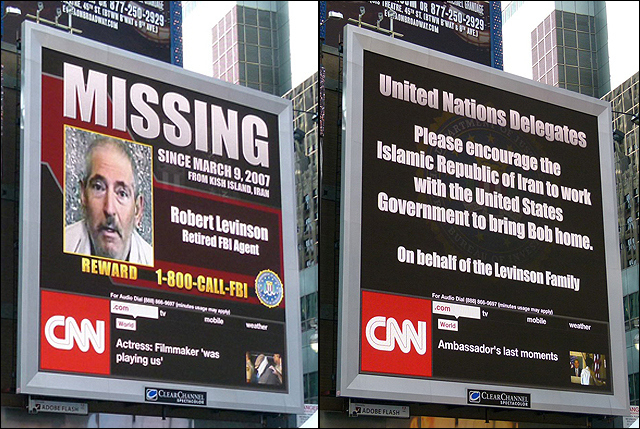
"Any bit of information, no matter how small, may be the piece that allows us to locate Bob and safely bring him back where he belongs," Maguire told BuzzFeed in an email.
The FBI will also work with the family to increase awareness on social media. Maguire told BuzzFeed the bureau will set up a Facebook page, in addition to the one the family already updates, with all the information they have, including ways for people to contact the FBI to provide any information they may have. There will be a dedicated FBI tip line specifically for this case, similar to what they did with the Benghazi attacks, where anyone can anonymously provide information. The plan is to get the effort going by July 1.
Maguire said that Levinson's situation is a unique one. The FBI has never lost a former agent abroad and certainly never for this long. To many, more than six years held in captivity held by an anonymous group that's managed to avoid detection by the U.S. government may seem like a lost cause. Factor in the fact that he's diabetic and the outlook grows more grim. But with no signals pointing either way, toward his demise or his survival, the FBI said it will continue to pursue any new leads that could lead to his safe return home. They couldn't confirm whether any tips have come in and ultimately failed to lead anywhere, but the bureau did say any lead will be investigated fully. What can be said for sure is the $1 million reward remains unclaimed.
It's difficult to move forward with a case like this when so little is known. Who exactly was he meeting? Where was he taken? How? Is he being cared for? Is he alive? But it's the fact his captors have shown no signs they plan to give him back that is most concerning. The few times his captors have reached out, they made no demands and offered no clues aside from a thinly veiled criticism of Guantanamo Bay. There's no obvious motive, no suspect, no evidence. Was he taken just because he was an American in the wrong place at the wrong time? There's no way to know, not yet.
To learn that he's dead would at least give his family closure. To learn who is holding him and why would give them a new way to approach the situation. But what they have now is worse, the constant anticipation of news. And all that can be done now is to make a widespread plea for help and pray that someone, anyone, answers the call.
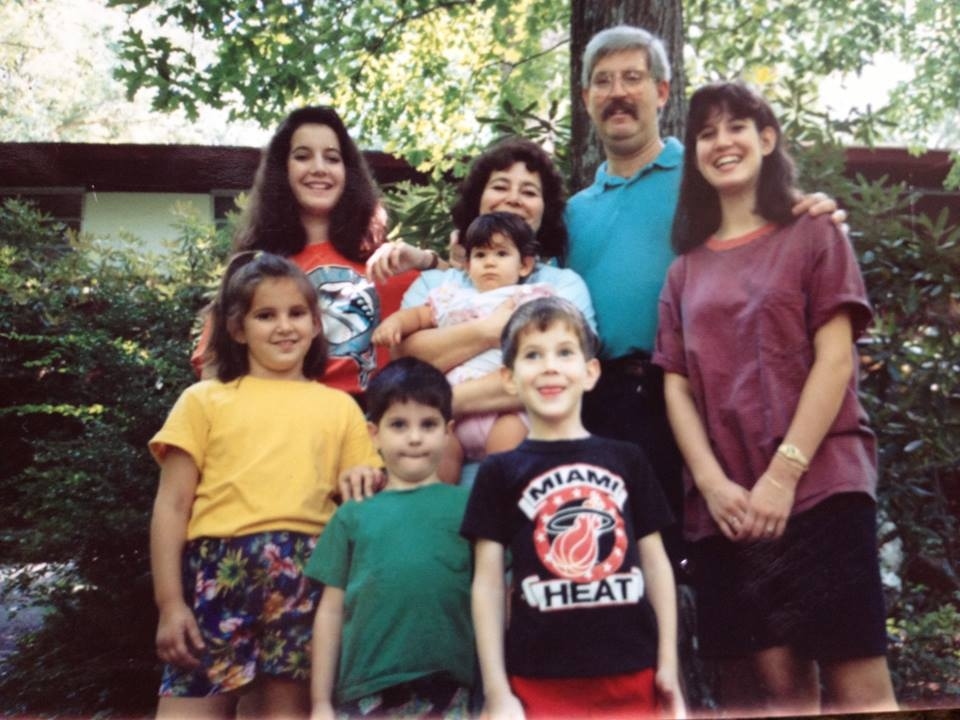
Sarah and Ryan live down a series of winding roads in the small New Jersey town of Chester, about an hour and a half from New York City. Inside, Sarah sits in her cavernous, mostly empty living room on a couch that engulfs her petite figure. She speaks softly, only increasing in volume when a strong memory of her father shoots into her mind and, unavoidably, across her lips. Sarah works from home, by choice "mostly because of the personal situation," in a technology group for a major bank. Six years later and still she doesn't want to be too far from home, just in case.
Her iPhone goes off from the other side of the room. Sarah looks over but ignores it. "If it starts going crazy that's when my heart starts to beat in hopes that it's my dad, hope that something's happened." She continues to reminisce, but the phone goes off again. She tries to ignore it this time but can't. She darts off the couch to look at her phone. She sighs. Nothing.
Since Levinson's disappearance, he's missed several family milestones including the birth of a grandchild and two of his daughters' weddings. "His existence was for his family and for the United States," Sarah says. Though he never got to meet his daughter Susan's husband, Levinson had met Ryan Moriarty, Sarah's husband, on a few occasions, which often included Levinson trying to convince Ryan to follow in his footsteps and join the FBI.
That was the kind of guy Levinson was, a larger-than-life type of personality who took joy simply in interacting with those around him. While at the FBI, he created "Pink Shirt Thursdays" when everyone would come in wearing pink shirts, a legacy his family is trying to continue to keep up awareness of their missing patriarch. He even hosted a field day at the local elementary school all his children attended in Florida. The school named the event after him when he went missing.
His family's attempts to keep his situation at the forefront of the minds of citizens and governments around the world come as the obvious suspect — the Iranian government, which U.S. intelligence has reportedly linked to Levinson's disappearance — has flatly denied any knowledge of his plight. Iran actually promised to help uncover details about Levinson's location on several occasions. The most recent promise came in March, around the sixth anniversary of his capture, when Iran's foreign minister Ali Akbar Salehi claimed that Levinson is not in Iran but that they are "ready to cooperate to help clarify how he disappeared."
One promise made early on was that the Iranian government would provide the family with a report on their investigation, but the family has yet to receive anything from them and now, with new leadership and constant political uncertainty, it's unclear if they ever will. Even Levinson's general location still can't be confirmed, though then-Secretary of State Hillary Clinton said in March 2011 they believed he was in "Southwest Asia" — diplo-speak for Iran.
Amidst unfulfilled promises and constant anticipation of good (and worry of bad) news, the Levinsons have tried to stay connected to him in any way they can. Some read through old emails to try to hear his voice, to remember the advice he'd often give. "I'm very, very proud of what you've done so far and know that you're going to be a big success in whatever it is that you decide to do," Levinson wrote to his then-college sophomore son David in February 2007, one month before he disappeared. "Just know I love you and I'll be there for you, whenever you need me."
Other times they'd call his voicemail to give him updates on their lives. Some called to tell him about a new job or a wedding proposal or a new niece who was born. For a long time they left a lot of messages, though not so much anymore, creating an oral family history that Levinson has never heard.
When Sarah and Ryan finally got married, Sarah carried a bouquet of white roses with a small portrait of her dad attached to the stems. "So I can tell him when he comes home that he walked me down the aisle," she says. The bouquet is perched atop a dark wooden mantelpiece off to the side of the living room across from a big grandfather clock that chimes every half hour, the photo still attached to the stems. The once vibrant white roses are wilted and brown.
Now Sarah's pregnant, due in October, and when her baby is born it could be another grandchild that "Grandpa Bob" has never met. Her sister has a granddaughter who has already grown up without ever meeting him, though they are trying to make the transition easy for her once Levinson returns home. They show her pictures of Levinson so she can know who he is when he returns. "She actually says, 'Grandpa Bob is in the desert riding on a camel,'" Sarah said, laughing to fight back tears.
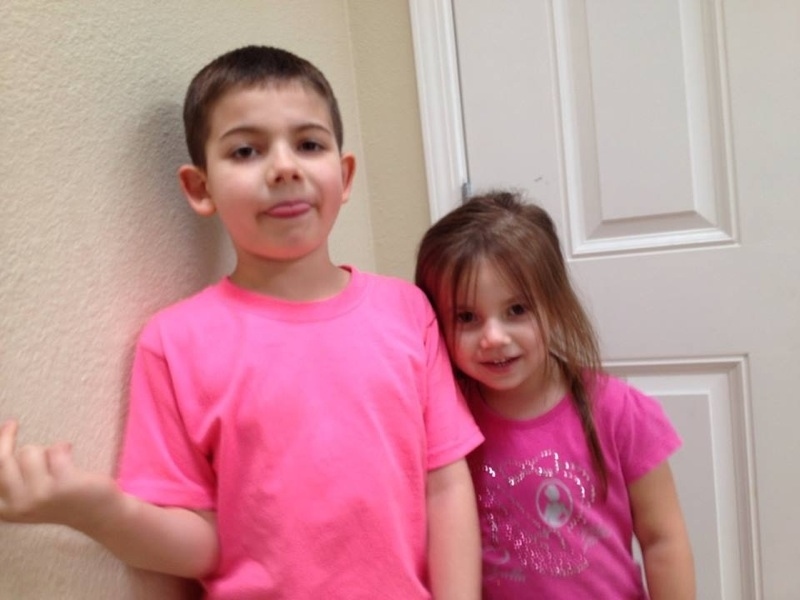
Levinson has only been seen or heard from twice since the day he went missing. The first was in 2011, when a video was sent from an anonymous email account, allegedly based out of Pakistan, featuring a frail looking Levinson pleading with the government to rescue him. Levinson was a big guy, 6 feet 4 inches tall and portly, but the video showed a pale, skinny Levinson with an unkempt beard and bags under his eyes. Sarah says she recognized him mainly because his eyes still had the compassion she'd come to know from her father. "Please help me get home. Thirty-three years of service to the United States deserves something," he pleaded in the video.
The next instance was also in 2011, though the family didn't make it public until January of this year. This time Levinson's captors sent five photos of Levinson dressed as a Guantanamo Bay inmate, complete with chains and an orange jumpsuit. He held signs with messages written in broken English.
"I Am HERE IN GUANTANAMO DO YOU KNOW WHERE IT IS?" one sign read. "HELP ME," was written plainly on another. The photos were sent from another anonymous email account, also apparently from Pakistan but different from the one used to send the video. Neither email account was used before sending the messages, and neither has been used since.
"It was so hard to see [the photos]," Sarah says. "Even when the news story broke when we shared them publicly, I couldn't look at them because they're — I mean, you look but it's just so hard. It's hard, but at the same time I see his eyes and I feel connected to him again."
But the lack of information hasn't caused the family to lose hope. No news is good news. When talking about him, they consciously use words like "when" and "will" to describe their future with Levinson. Never "if" or "maybe." The few times Sarah did talk about him in a way she felt wasn't optimistic enough, she'd correct herself to make her phrasing more certain and defiant.
"Hopefully one of these days we'll get him home," she says. Then shaking the thought off, adds, "I know we will. We won't stop until we get him home."
The reality of the situation is brutally clear to the Levinsons. They know there are some who have been captured and released, others who weren't so fortunate — Mary Colvin, Tim Hetherington, and Daniel Pearl among the most recent, well-known citizens killed while working abroad — and still others like Austin Tice, whose fate remains unknown.
Sarah Shourd (held 410 days in Iran) and Terry Anderson (held six years and nine months in Beirut) are among the survivors who have reached out to the Levinson family. Sarah said they offered advice, encouragement, and perspective on what Levinson is likely facing, wherever he may be. Though they tried to reassure the family — "Don't worry, I survived it," Anderson told them. "I've gotten through it and I'm still here and I'm OK." — words aren't always enough.
"Anyone that we've talked to, you can tell that they went through so much pain," Sarah said. "I just can't. It doesn't help to think what my father is going through."
If not recovered by Nov. 26, Levinson will pass Anderson as the longest held hostage in American history.
With all the media and attention the the family has received, they really just want Levinson to come home. And as the government and social media efforts continue to fail to get them any closer to his return, they've turned to faith. Sarah, a staunch Catholic, prays to whoever she can in hopes it will bring him back safely: to Saint Joseph, the patron saint of fathers, Saint Anthony, the patron saint of lost things, to Saint Jude — miracles.
She takes a big breath, as if allowing every memory of her father to creep up into her head, and she exhales. "Not a moment goes by without thinking of him," she said.
